An Evaluation of UK Police's Ability to Effectively Handle Hate Crime
VerifiedAdded on 2021/08/06
|13
|3233
|72
Essay
AI Summary
This essay assesses the effectiveness of the UK police in addressing hate crime. It begins with a definition of hate crime and discusses the increasing frequency of such crimes in the UK, citing statistical data and trends from 2018 to 2019, as well as long-term trends. The essay examines the impact of hate crimes and the government's approach to the issue, including strategies and inspections. It explores the effectiveness of the police's strategies, including awareness campaigns and their approach to handling reported incidents. The analysis includes an overview of the laws in place, the government's role, and the outcomes of the police's actions. The essay concludes with an evaluation of the police's ability to effectively deal with the rising concern of hate crime in the UK, drawing on the data and findings presented.
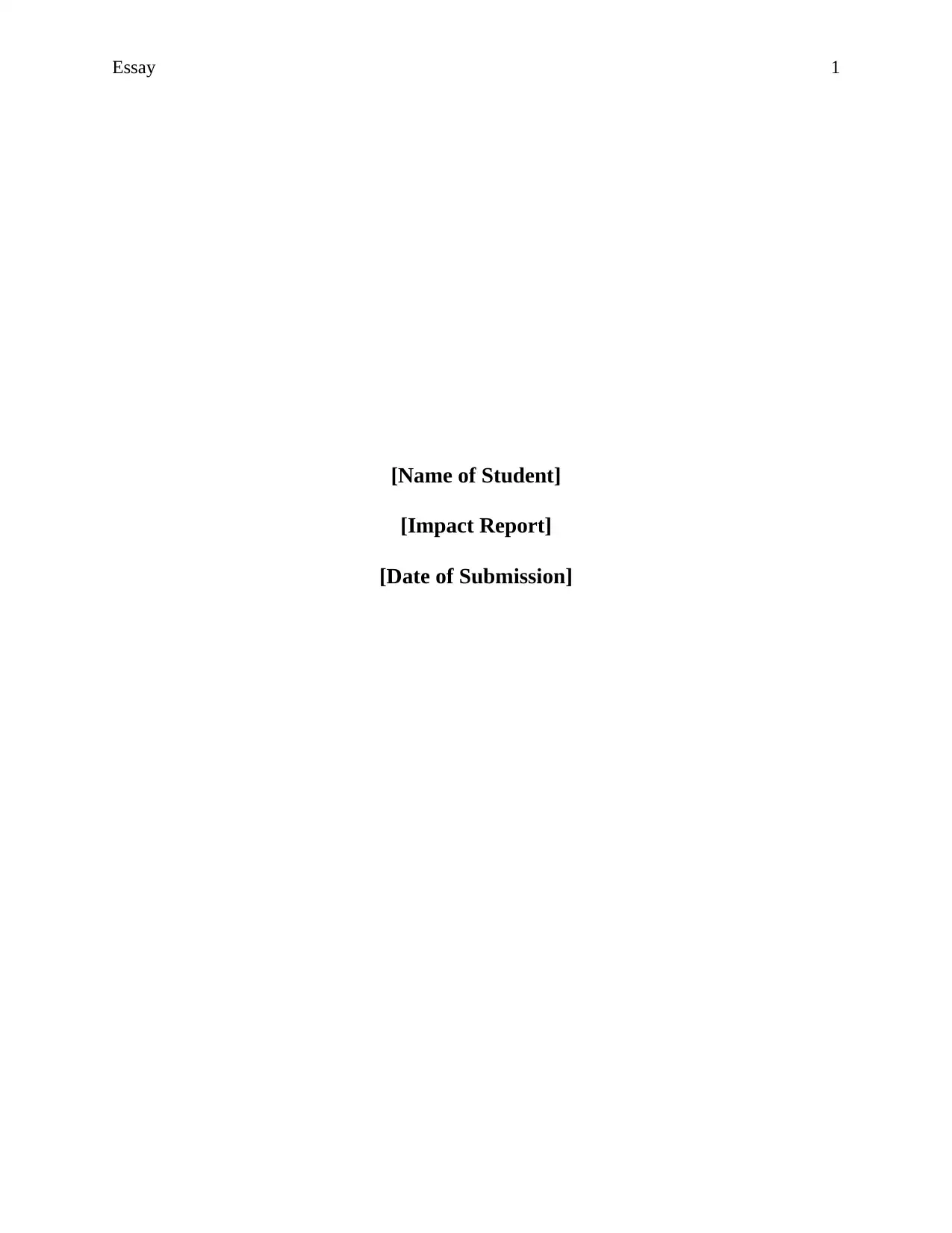
Essay 1
[Name of Student]
[Impact Report]
[Date of Submission]
[Name of Student]
[Impact Report]
[Date of Submission]
Paraphrase This Document
Need a fresh take? Get an instant paraphrase of this document with our AI Paraphraser
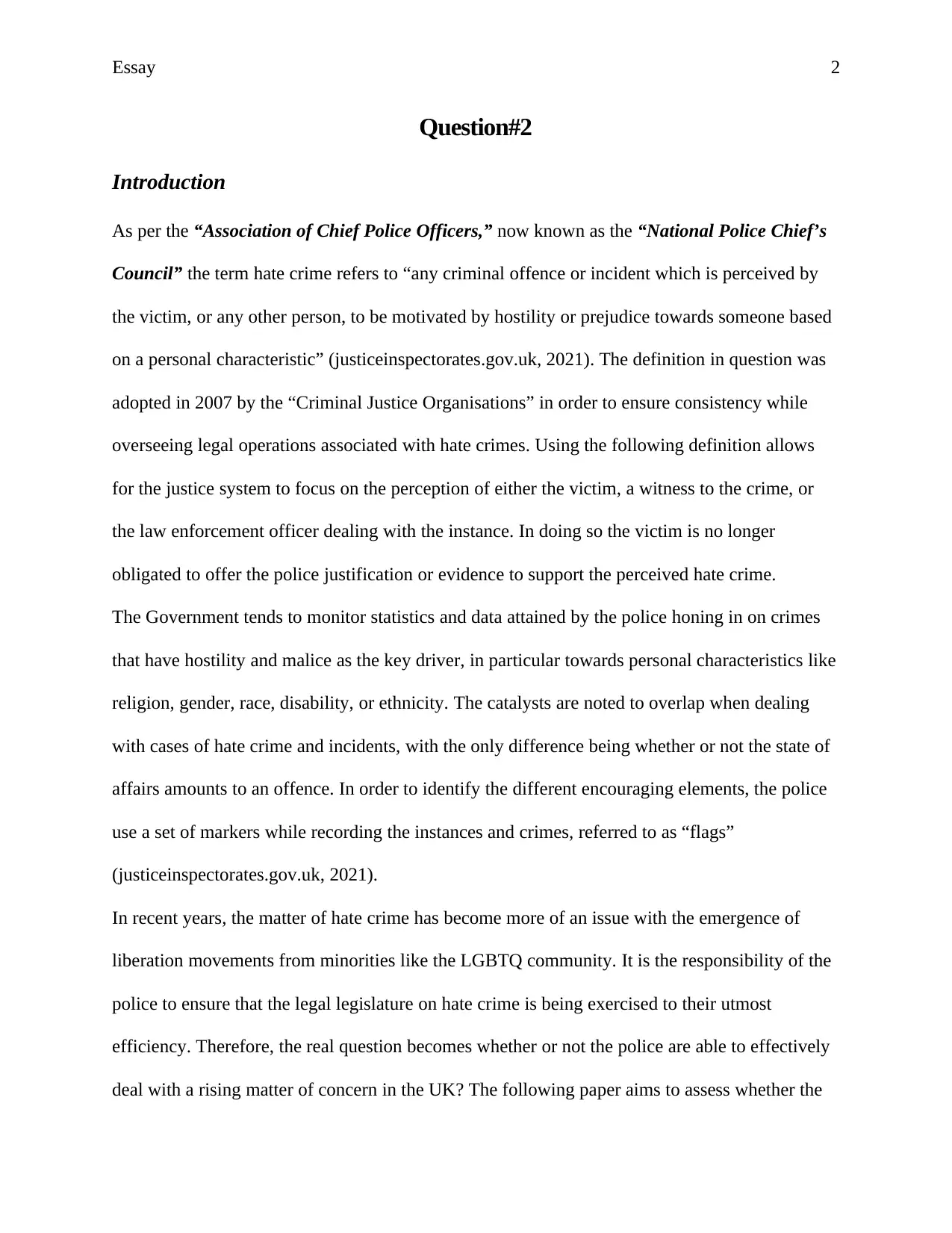
Essay 2
Question#2
Introduction
As per the “Association of Chief Police Officers,” now known as the “National Police Chief’s
Council” the term hate crime refers to “any criminal offence or incident which is perceived by
the victim, or any other person, to be motivated by hostility or prejudice towards someone based
on a personal characteristic” (justiceinspectorates.gov.uk, 2021). The definition in question was
adopted in 2007 by the “Criminal Justice Organisations” in order to ensure consistency while
overseeing legal operations associated with hate crimes. Using the following definition allows
for the justice system to focus on the perception of either the victim, a witness to the crime, or
the law enforcement officer dealing with the instance. In doing so the victim is no longer
obligated to offer the police justification or evidence to support the perceived hate crime.
The Government tends to monitor statistics and data attained by the police honing in on crimes
that have hostility and malice as the key driver, in particular towards personal characteristics like
religion, gender, race, disability, or ethnicity. The catalysts are noted to overlap when dealing
with cases of hate crime and incidents, with the only difference being whether or not the state of
affairs amounts to an offence. In order to identify the different encouraging elements, the police
use a set of markers while recording the instances and crimes, referred to as “flags”
(justiceinspectorates.gov.uk, 2021).
In recent years, the matter of hate crime has become more of an issue with the emergence of
liberation movements from minorities like the LGBTQ community. It is the responsibility of the
police to ensure that the legal legislature on hate crime is being exercised to their utmost
efficiency. Therefore, the real question becomes whether or not the police are able to effectively
deal with a rising matter of concern in the UK? The following paper aims to assess whether the
Question#2
Introduction
As per the “Association of Chief Police Officers,” now known as the “National Police Chief’s
Council” the term hate crime refers to “any criminal offence or incident which is perceived by
the victim, or any other person, to be motivated by hostility or prejudice towards someone based
on a personal characteristic” (justiceinspectorates.gov.uk, 2021). The definition in question was
adopted in 2007 by the “Criminal Justice Organisations” in order to ensure consistency while
overseeing legal operations associated with hate crimes. Using the following definition allows
for the justice system to focus on the perception of either the victim, a witness to the crime, or
the law enforcement officer dealing with the instance. In doing so the victim is no longer
obligated to offer the police justification or evidence to support the perceived hate crime.
The Government tends to monitor statistics and data attained by the police honing in on crimes
that have hostility and malice as the key driver, in particular towards personal characteristics like
religion, gender, race, disability, or ethnicity. The catalysts are noted to overlap when dealing
with cases of hate crime and incidents, with the only difference being whether or not the state of
affairs amounts to an offence. In order to identify the different encouraging elements, the police
use a set of markers while recording the instances and crimes, referred to as “flags”
(justiceinspectorates.gov.uk, 2021).
In recent years, the matter of hate crime has become more of an issue with the emergence of
liberation movements from minorities like the LGBTQ community. It is the responsibility of the
police to ensure that the legal legislature on hate crime is being exercised to their utmost
efficiency. Therefore, the real question becomes whether or not the police are able to effectively
deal with a rising matter of concern in the UK? The following paper aims to assess whether the
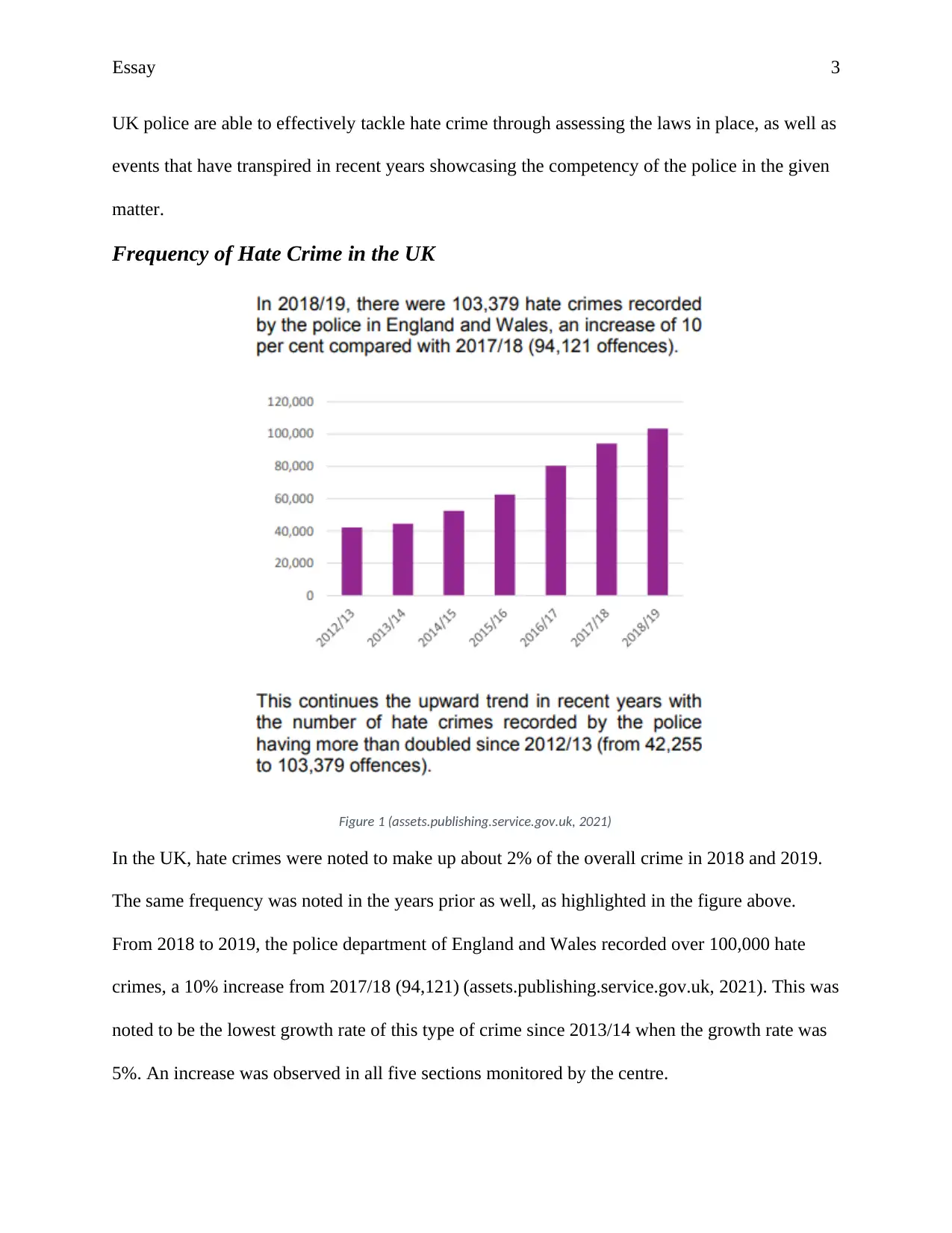
Essay 3
UK police are able to effectively tackle hate crime through assessing the laws in place, as well as
events that have transpired in recent years showcasing the competency of the police in the given
matter.
Frequency of Hate Crime in the UK
Figure 1 (assets.publishing.service.gov.uk, 2021)
In the UK, hate crimes were noted to make up about 2% of the overall crime in 2018 and 2019.
The same frequency was noted in the years prior as well, as highlighted in the figure above.
From 2018 to 2019, the police department of England and Wales recorded over 100,000 hate
crimes, a 10% increase from 2017/18 (94,121) (assets.publishing.service.gov.uk, 2021). This was
noted to be the lowest growth rate of this type of crime since 2013/14 when the growth rate was
5%. An increase was observed in all five sections monitored by the centre.
UK police are able to effectively tackle hate crime through assessing the laws in place, as well as
events that have transpired in recent years showcasing the competency of the police in the given
matter.
Frequency of Hate Crime in the UK
Figure 1 (assets.publishing.service.gov.uk, 2021)
In the UK, hate crimes were noted to make up about 2% of the overall crime in 2018 and 2019.
The same frequency was noted in the years prior as well, as highlighted in the figure above.
From 2018 to 2019, the police department of England and Wales recorded over 100,000 hate
crimes, a 10% increase from 2017/18 (94,121) (assets.publishing.service.gov.uk, 2021). This was
noted to be the lowest growth rate of this type of crime since 2013/14 when the growth rate was
5%. An increase was observed in all five sections monitored by the centre.
⊘ This is a preview!⊘
Do you want full access?
Subscribe today to unlock all pages.

Trusted by 1+ million students worldwide
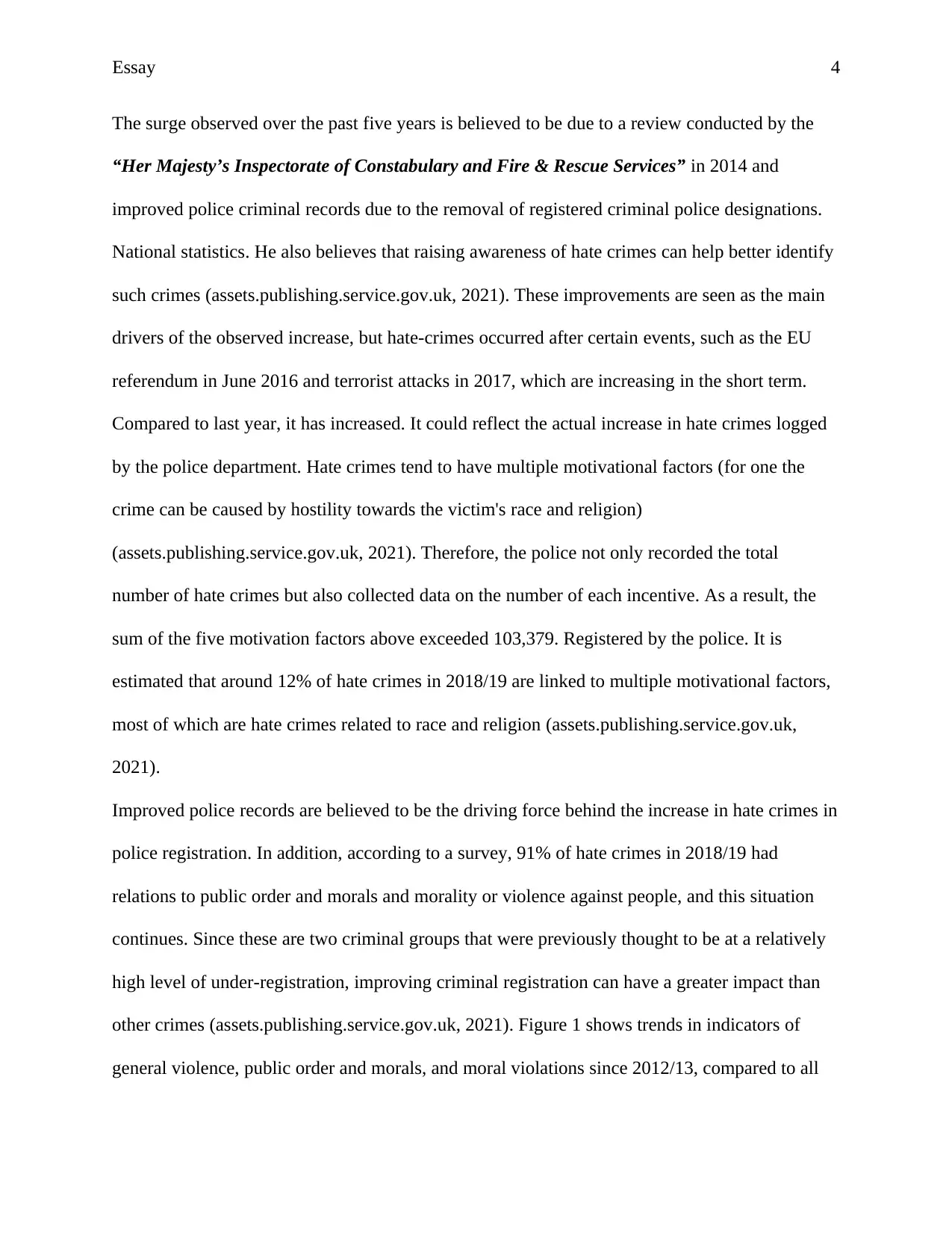
Essay 4
The surge observed over the past five years is believed to be due to a review conducted by the
“Her Majesty’s Inspectorate of Constabulary and Fire & Rescue Services” in 2014 and
improved police criminal records due to the removal of registered criminal police designations.
National statistics. He also believes that raising awareness of hate crimes can help better identify
such crimes (assets.publishing.service.gov.uk, 2021). These improvements are seen as the main
drivers of the observed increase, but hate-crimes occurred after certain events, such as the EU
referendum in June 2016 and terrorist attacks in 2017, which are increasing in the short term.
Compared to last year, it has increased. It could reflect the actual increase in hate crimes logged
by the police department. Hate crimes tend to have multiple motivational factors (for one the
crime can be caused by hostility towards the victim's race and religion)
(assets.publishing.service.gov.uk, 2021). Therefore, the police not only recorded the total
number of hate crimes but also collected data on the number of each incentive. As a result, the
sum of the five motivation factors above exceeded 103,379. Registered by the police. It is
estimated that around 12% of hate crimes in 2018/19 are linked to multiple motivational factors,
most of which are hate crimes related to race and religion (assets.publishing.service.gov.uk,
2021).
Improved police records are believed to be the driving force behind the increase in hate crimes in
police registration. In addition, according to a survey, 91% of hate crimes in 2018/19 had
relations to public order and morals and morality or violence against people, and this situation
continues. Since these are two criminal groups that were previously thought to be at a relatively
high level of under-registration, improving criminal registration can have a greater impact than
other crimes (assets.publishing.service.gov.uk, 2021). Figure 1 shows trends in indicators of
general violence, public order and morals, and moral violations since 2012/13, compared to all
The surge observed over the past five years is believed to be due to a review conducted by the
“Her Majesty’s Inspectorate of Constabulary and Fire & Rescue Services” in 2014 and
improved police criminal records due to the removal of registered criminal police designations.
National statistics. He also believes that raising awareness of hate crimes can help better identify
such crimes (assets.publishing.service.gov.uk, 2021). These improvements are seen as the main
drivers of the observed increase, but hate-crimes occurred after certain events, such as the EU
referendum in June 2016 and terrorist attacks in 2017, which are increasing in the short term.
Compared to last year, it has increased. It could reflect the actual increase in hate crimes logged
by the police department. Hate crimes tend to have multiple motivational factors (for one the
crime can be caused by hostility towards the victim's race and religion)
(assets.publishing.service.gov.uk, 2021). Therefore, the police not only recorded the total
number of hate crimes but also collected data on the number of each incentive. As a result, the
sum of the five motivation factors above exceeded 103,379. Registered by the police. It is
estimated that around 12% of hate crimes in 2018/19 are linked to multiple motivational factors,
most of which are hate crimes related to race and religion (assets.publishing.service.gov.uk,
2021).
Improved police records are believed to be the driving force behind the increase in hate crimes in
police registration. In addition, according to a survey, 91% of hate crimes in 2018/19 had
relations to public order and morals and morality or violence against people, and this situation
continues. Since these are two criminal groups that were previously thought to be at a relatively
high level of under-registration, improving criminal registration can have a greater impact than
other crimes (assets.publishing.service.gov.uk, 2021). Figure 1 shows trends in indicators of
general violence, public order and morals, and moral violations since 2012/13, compared to all
Paraphrase This Document
Need a fresh take? Get an instant paraphrase of this document with our AI Paraphraser
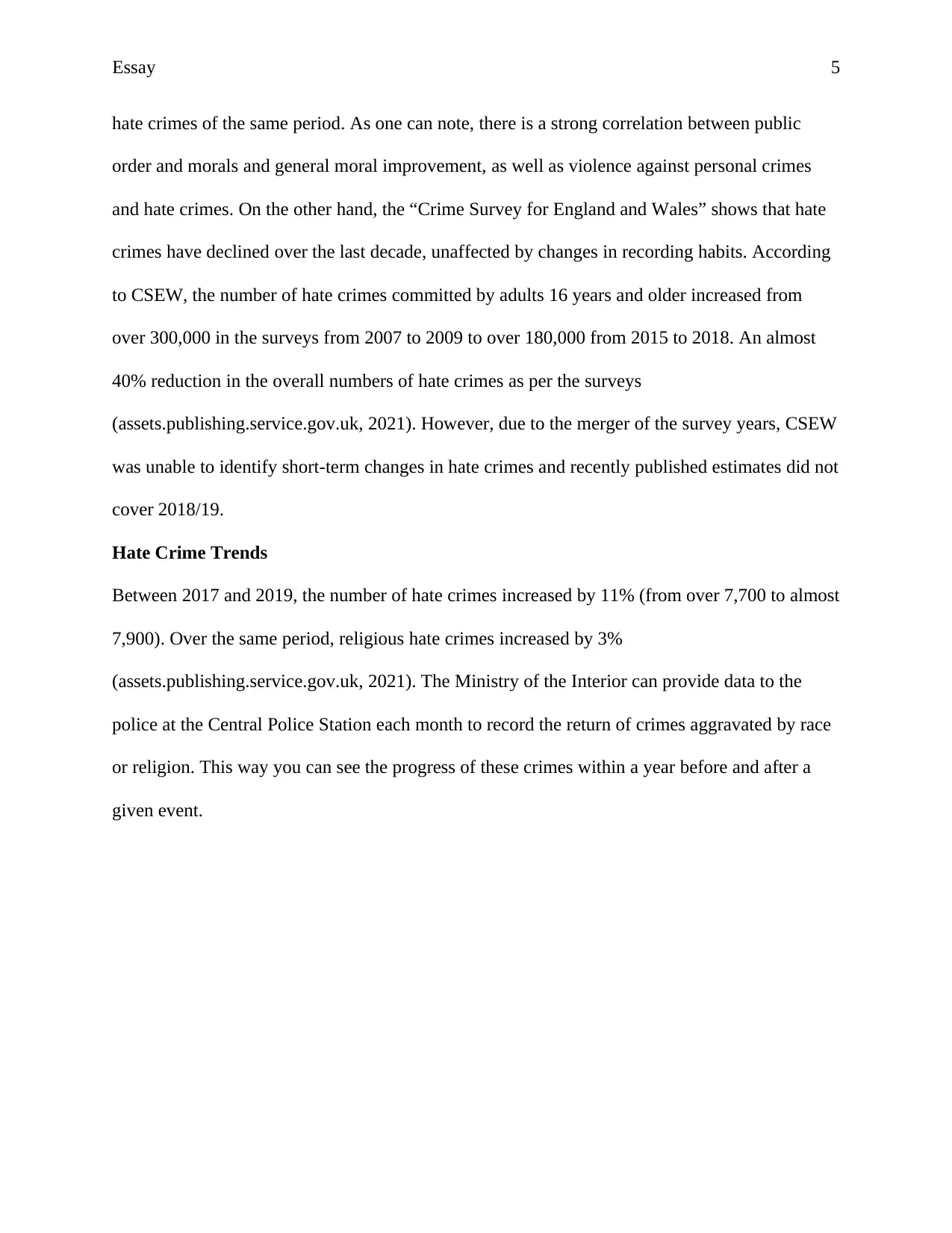
Essay 5
hate crimes of the same period. As one can note, there is a strong correlation between public
order and morals and general moral improvement, as well as violence against personal crimes
and hate crimes. On the other hand, the “Crime Survey for England and Wales” shows that hate
crimes have declined over the last decade, unaffected by changes in recording habits. According
to CSEW, the number of hate crimes committed by adults 16 years and older increased from
over 300,000 in the surveys from 2007 to 2009 to over 180,000 from 2015 to 2018. An almost
40% reduction in the overall numbers of hate crimes as per the surveys
(assets.publishing.service.gov.uk, 2021). However, due to the merger of the survey years, CSEW
was unable to identify short-term changes in hate crimes and recently published estimates did not
cover 2018/19.
Hate Crime Trends
Between 2017 and 2019, the number of hate crimes increased by 11% (from over 7,700 to almost
7,900). Over the same period, religious hate crimes increased by 3%
(assets.publishing.service.gov.uk, 2021). The Ministry of the Interior can provide data to the
police at the Central Police Station each month to record the return of crimes aggravated by race
or religion. This way you can see the progress of these crimes within a year before and after a
given event.
hate crimes of the same period. As one can note, there is a strong correlation between public
order and morals and general moral improvement, as well as violence against personal crimes
and hate crimes. On the other hand, the “Crime Survey for England and Wales” shows that hate
crimes have declined over the last decade, unaffected by changes in recording habits. According
to CSEW, the number of hate crimes committed by adults 16 years and older increased from
over 300,000 in the surveys from 2007 to 2009 to over 180,000 from 2015 to 2018. An almost
40% reduction in the overall numbers of hate crimes as per the surveys
(assets.publishing.service.gov.uk, 2021). However, due to the merger of the survey years, CSEW
was unable to identify short-term changes in hate crimes and recently published estimates did not
cover 2018/19.
Hate Crime Trends
Between 2017 and 2019, the number of hate crimes increased by 11% (from over 7,700 to almost
7,900). Over the same period, religious hate crimes increased by 3%
(assets.publishing.service.gov.uk, 2021). The Ministry of the Interior can provide data to the
police at the Central Police Station each month to record the return of crimes aggravated by race
or religion. This way you can see the progress of these crimes within a year before and after a
given event.
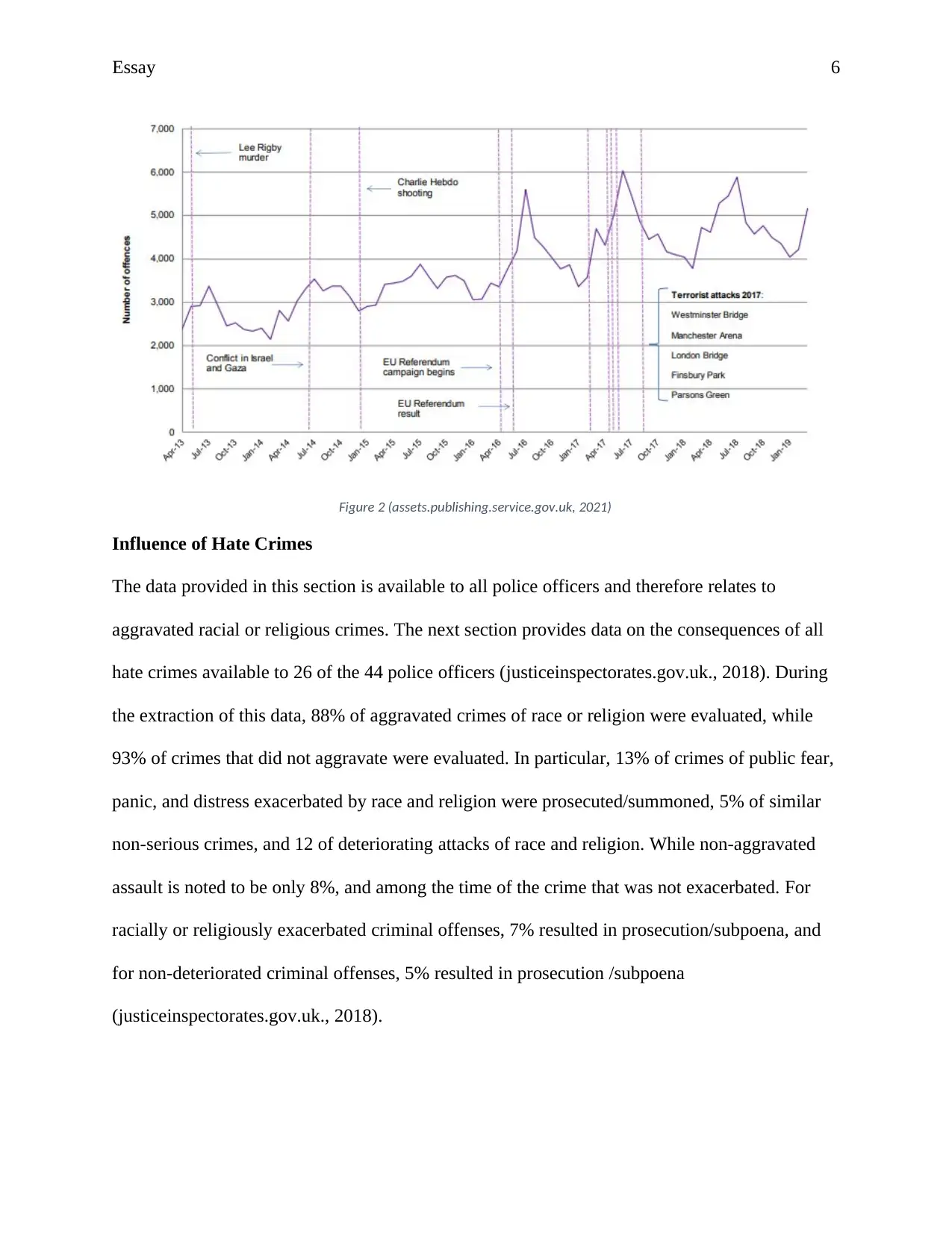
Essay 6
Figure 2 (assets.publishing.service.gov.uk, 2021)
Influence of Hate Crimes
The data provided in this section is available to all police officers and therefore relates to
aggravated racial or religious crimes. The next section provides data on the consequences of all
hate crimes available to 26 of the 44 police officers (justiceinspectorates.gov.uk., 2018). During
the extraction of this data, 88% of aggravated crimes of race or religion were evaluated, while
93% of crimes that did not aggravate were evaluated. In particular, 13% of crimes of public fear,
panic, and distress exacerbated by race and religion were prosecuted/summoned, 5% of similar
non-serious crimes, and 12 of deteriorating attacks of race and religion. While non-aggravated
assault is noted to be only 8%, and among the time of the crime that was not exacerbated. For
racially or religiously exacerbated criminal offenses, 7% resulted in prosecution/subpoena, and
for non-deteriorated criminal offenses, 5% resulted in prosecution /subpoena
(justiceinspectorates.gov.uk., 2018).
Figure 2 (assets.publishing.service.gov.uk, 2021)
Influence of Hate Crimes
The data provided in this section is available to all police officers and therefore relates to
aggravated racial or religious crimes. The next section provides data on the consequences of all
hate crimes available to 26 of the 44 police officers (justiceinspectorates.gov.uk., 2018). During
the extraction of this data, 88% of aggravated crimes of race or religion were evaluated, while
93% of crimes that did not aggravate were evaluated. In particular, 13% of crimes of public fear,
panic, and distress exacerbated by race and religion were prosecuted/summoned, 5% of similar
non-serious crimes, and 12 of deteriorating attacks of race and religion. While non-aggravated
assault is noted to be only 8%, and among the time of the crime that was not exacerbated. For
racially or religiously exacerbated criminal offenses, 7% resulted in prosecution/subpoena, and
for non-deteriorated criminal offenses, 5% resulted in prosecution /subpoena
(justiceinspectorates.gov.uk., 2018).
⊘ This is a preview!⊘
Do you want full access?
Subscribe today to unlock all pages.

Trusted by 1+ million students worldwide
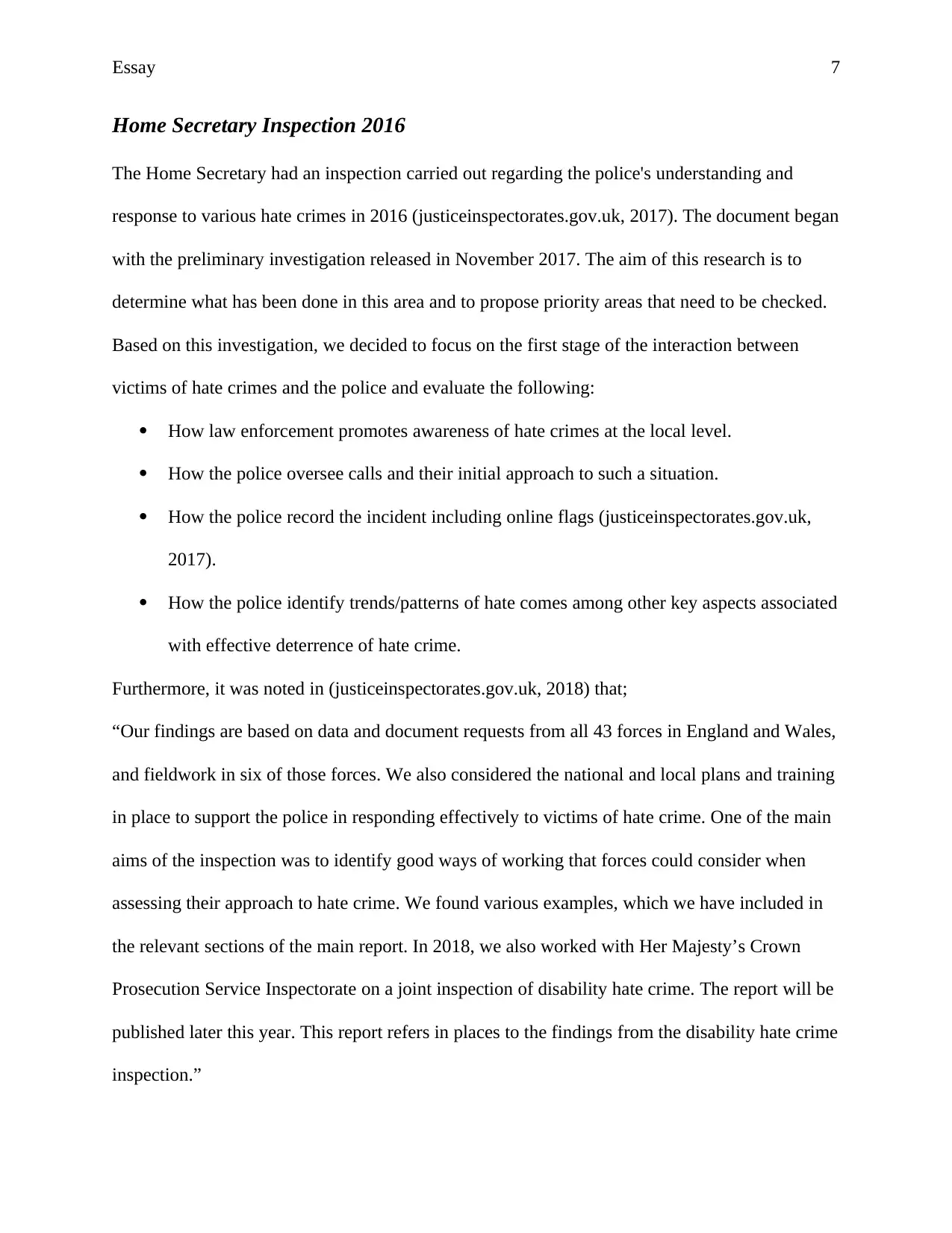
Essay 7
Home Secretary Inspection 2016
The Home Secretary had an inspection carried out regarding the police's understanding and
response to various hate crimes in 2016 (justiceinspectorates.gov.uk, 2017). The document began
with the preliminary investigation released in November 2017. The aim of this research is to
determine what has been done in this area and to propose priority areas that need to be checked.
Based on this investigation, we decided to focus on the first stage of the interaction between
victims of hate crimes and the police and evaluate the following:
How law enforcement promotes awareness of hate crimes at the local level.
How the police oversee calls and their initial approach to such a situation.
How the police record the incident including online flags (justiceinspectorates.gov.uk,
2017).
How the police identify trends/patterns of hate comes among other key aspects associated
with effective deterrence of hate crime.
Furthermore, it was noted in (justiceinspectorates.gov.uk, 2018) that;
“Our findings are based on data and document requests from all 43 forces in England and Wales,
and fieldwork in six of those forces. We also considered the national and local plans and training
in place to support the police in responding effectively to victims of hate crime. One of the main
aims of the inspection was to identify good ways of working that forces could consider when
assessing their approach to hate crime. We found various examples, which we have included in
the relevant sections of the main report. In 2018, we also worked with Her Majesty’s Crown
Prosecution Service Inspectorate on a joint inspection of disability hate crime. The report will be
published later this year. This report refers in places to the findings from the disability hate crime
inspection.”
Home Secretary Inspection 2016
The Home Secretary had an inspection carried out regarding the police's understanding and
response to various hate crimes in 2016 (justiceinspectorates.gov.uk, 2017). The document began
with the preliminary investigation released in November 2017. The aim of this research is to
determine what has been done in this area and to propose priority areas that need to be checked.
Based on this investigation, we decided to focus on the first stage of the interaction between
victims of hate crimes and the police and evaluate the following:
How law enforcement promotes awareness of hate crimes at the local level.
How the police oversee calls and their initial approach to such a situation.
How the police record the incident including online flags (justiceinspectorates.gov.uk,
2017).
How the police identify trends/patterns of hate comes among other key aspects associated
with effective deterrence of hate crime.
Furthermore, it was noted in (justiceinspectorates.gov.uk, 2018) that;
“Our findings are based on data and document requests from all 43 forces in England and Wales,
and fieldwork in six of those forces. We also considered the national and local plans and training
in place to support the police in responding effectively to victims of hate crime. One of the main
aims of the inspection was to identify good ways of working that forces could consider when
assessing their approach to hate crime. We found various examples, which we have included in
the relevant sections of the main report. In 2018, we also worked with Her Majesty’s Crown
Prosecution Service Inspectorate on a joint inspection of disability hate crime. The report will be
published later this year. This report refers in places to the findings from the disability hate crime
inspection.”
Paraphrase This Document
Need a fresh take? Get an instant paraphrase of this document with our AI Paraphraser
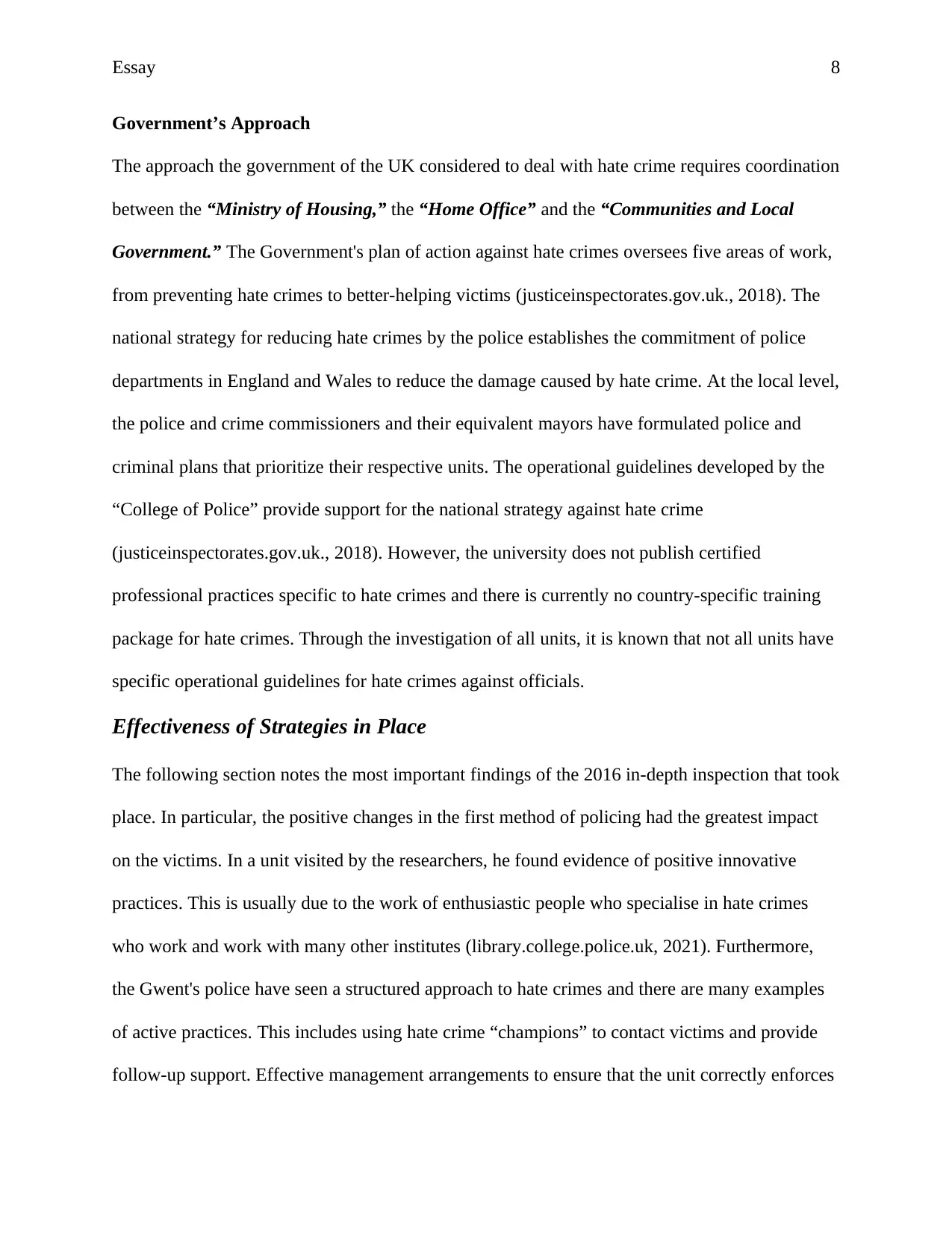
Essay 8
Government’s Approach
The approach the government of the UK considered to deal with hate crime requires coordination
between the “Ministry of Housing,” the “Home Office” and the “Communities and Local
Government.” The Government's plan of action against hate crimes oversees five areas of work,
from preventing hate crimes to better-helping victims (justiceinspectorates.gov.uk., 2018). The
national strategy for reducing hate crimes by the police establishes the commitment of police
departments in England and Wales to reduce the damage caused by hate crime. At the local level,
the police and crime commissioners and their equivalent mayors have formulated police and
criminal plans that prioritize their respective units. The operational guidelines developed by the
“College of Police” provide support for the national strategy against hate crime
(justiceinspectorates.gov.uk., 2018). However, the university does not publish certified
professional practices specific to hate crimes and there is currently no country-specific training
package for hate crimes. Through the investigation of all units, it is known that not all units have
specific operational guidelines for hate crimes against officials.
Effectiveness of Strategies in Place
The following section notes the most important findings of the 2016 in-depth inspection that took
place. In particular, the positive changes in the first method of policing had the greatest impact
on the victims. In a unit visited by the researchers, he found evidence of positive innovative
practices. This is usually due to the work of enthusiastic people who specialise in hate crimes
who work and work with many other institutes (library.college.police.uk, 2021). Furthermore,
the Gwent's police have seen a structured approach to hate crimes and there are many examples
of active practices. This includes using hate crime “champions” to contact victims and provide
follow-up support. Effective management arrangements to ensure that the unit correctly enforces
Government’s Approach
The approach the government of the UK considered to deal with hate crime requires coordination
between the “Ministry of Housing,” the “Home Office” and the “Communities and Local
Government.” The Government's plan of action against hate crimes oversees five areas of work,
from preventing hate crimes to better-helping victims (justiceinspectorates.gov.uk., 2018). The
national strategy for reducing hate crimes by the police establishes the commitment of police
departments in England and Wales to reduce the damage caused by hate crime. At the local level,
the police and crime commissioners and their equivalent mayors have formulated police and
criminal plans that prioritize their respective units. The operational guidelines developed by the
“College of Police” provide support for the national strategy against hate crime
(justiceinspectorates.gov.uk., 2018). However, the university does not publish certified
professional practices specific to hate crimes and there is currently no country-specific training
package for hate crimes. Through the investigation of all units, it is known that not all units have
specific operational guidelines for hate crimes against officials.
Effectiveness of Strategies in Place
The following section notes the most important findings of the 2016 in-depth inspection that took
place. In particular, the positive changes in the first method of policing had the greatest impact
on the victims. In a unit visited by the researchers, he found evidence of positive innovative
practices. This is usually due to the work of enthusiastic people who specialise in hate crimes
who work and work with many other institutes (library.college.police.uk, 2021). Furthermore,
the Gwent's police have seen a structured approach to hate crimes and there are many examples
of active practices. This includes using hate crime “champions” to contact victims and provide
follow-up support. Effective management arrangements to ensure that the unit correctly enforces
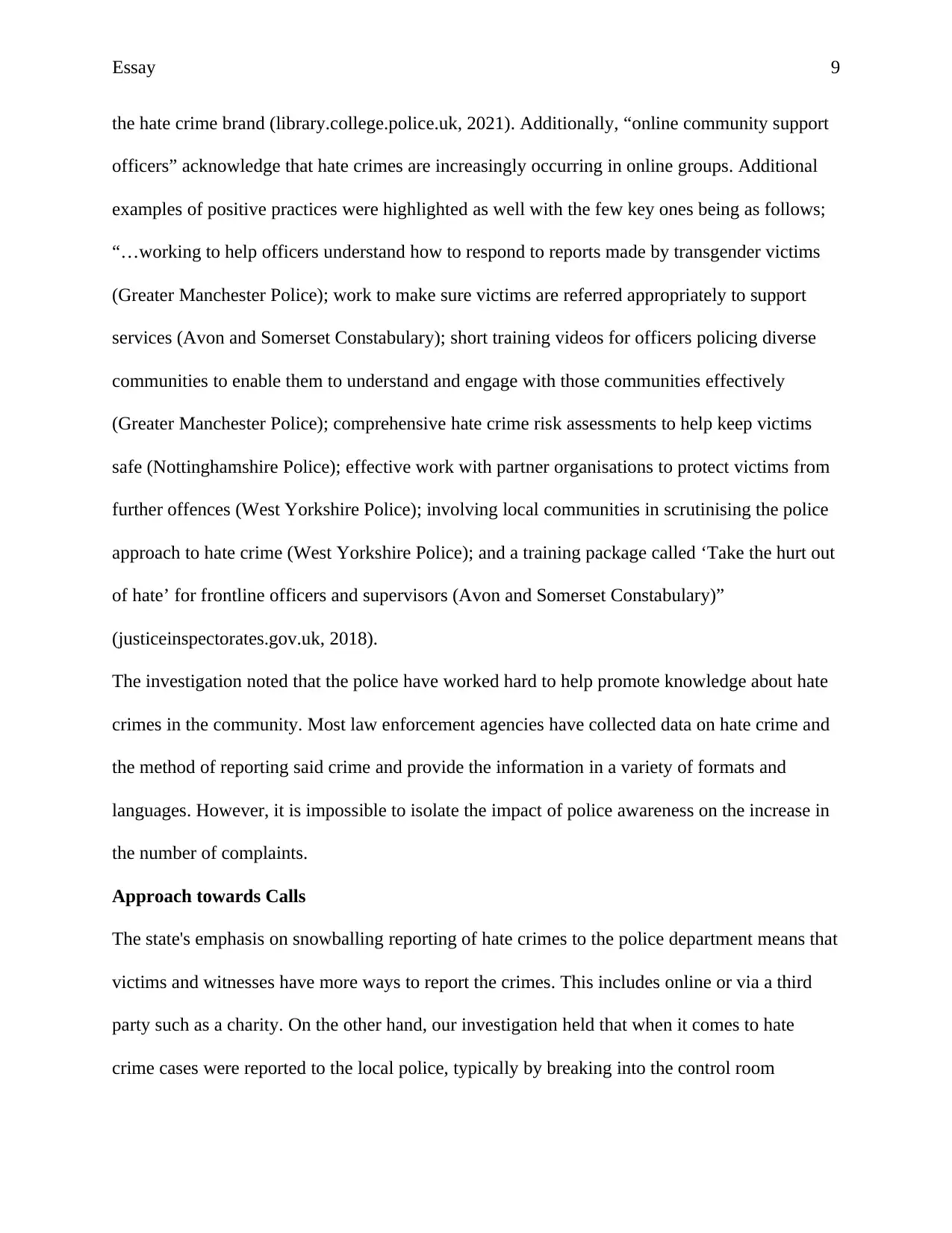
Essay 9
the hate crime brand (library.college.police.uk, 2021). Additionally, “online community support
officers” acknowledge that hate crimes are increasingly occurring in online groups. Additional
examples of positive practices were highlighted as well with the few key ones being as follows;
“…working to help officers understand how to respond to reports made by transgender victims
(Greater Manchester Police); work to make sure victims are referred appropriately to support
services (Avon and Somerset Constabulary); short training videos for officers policing diverse
communities to enable them to understand and engage with those communities effectively
(Greater Manchester Police); comprehensive hate crime risk assessments to help keep victims
safe (Nottinghamshire Police); effective work with partner organisations to protect victims from
further offences (West Yorkshire Police); involving local communities in scrutinising the police
approach to hate crime (West Yorkshire Police); and a training package called ‘Take the hurt out
of hate’ for frontline officers and supervisors (Avon and Somerset Constabulary)”
(justiceinspectorates.gov.uk, 2018).
The investigation noted that the police have worked hard to help promote knowledge about hate
crimes in the community. Most law enforcement agencies have collected data on hate crime and
the method of reporting said crime and provide the information in a variety of formats and
languages. However, it is impossible to isolate the impact of police awareness on the increase in
the number of complaints.
Approach towards Calls
The state's emphasis on snowballing reporting of hate crimes to the police department means that
victims and witnesses have more ways to report the crimes. This includes online or via a third
party such as a charity. On the other hand, our investigation held that when it comes to hate
crime cases were reported to the local police, typically by breaking into the control room
the hate crime brand (library.college.police.uk, 2021). Additionally, “online community support
officers” acknowledge that hate crimes are increasingly occurring in online groups. Additional
examples of positive practices were highlighted as well with the few key ones being as follows;
“…working to help officers understand how to respond to reports made by transgender victims
(Greater Manchester Police); work to make sure victims are referred appropriately to support
services (Avon and Somerset Constabulary); short training videos for officers policing diverse
communities to enable them to understand and engage with those communities effectively
(Greater Manchester Police); comprehensive hate crime risk assessments to help keep victims
safe (Nottinghamshire Police); effective work with partner organisations to protect victims from
further offences (West Yorkshire Police); involving local communities in scrutinising the police
approach to hate crime (West Yorkshire Police); and a training package called ‘Take the hurt out
of hate’ for frontline officers and supervisors (Avon and Somerset Constabulary)”
(justiceinspectorates.gov.uk, 2018).
The investigation noted that the police have worked hard to help promote knowledge about hate
crimes in the community. Most law enforcement agencies have collected data on hate crime and
the method of reporting said crime and provide the information in a variety of formats and
languages. However, it is impossible to isolate the impact of police awareness on the increase in
the number of complaints.
Approach towards Calls
The state's emphasis on snowballing reporting of hate crimes to the police department means that
victims and witnesses have more ways to report the crimes. This includes online or via a third
party such as a charity. On the other hand, our investigation held that when it comes to hate
crime cases were reported to the local police, typically by breaking into the control room
⊘ This is a preview!⊘
Do you want full access?
Subscribe today to unlock all pages.

Trusted by 1+ million students worldwide
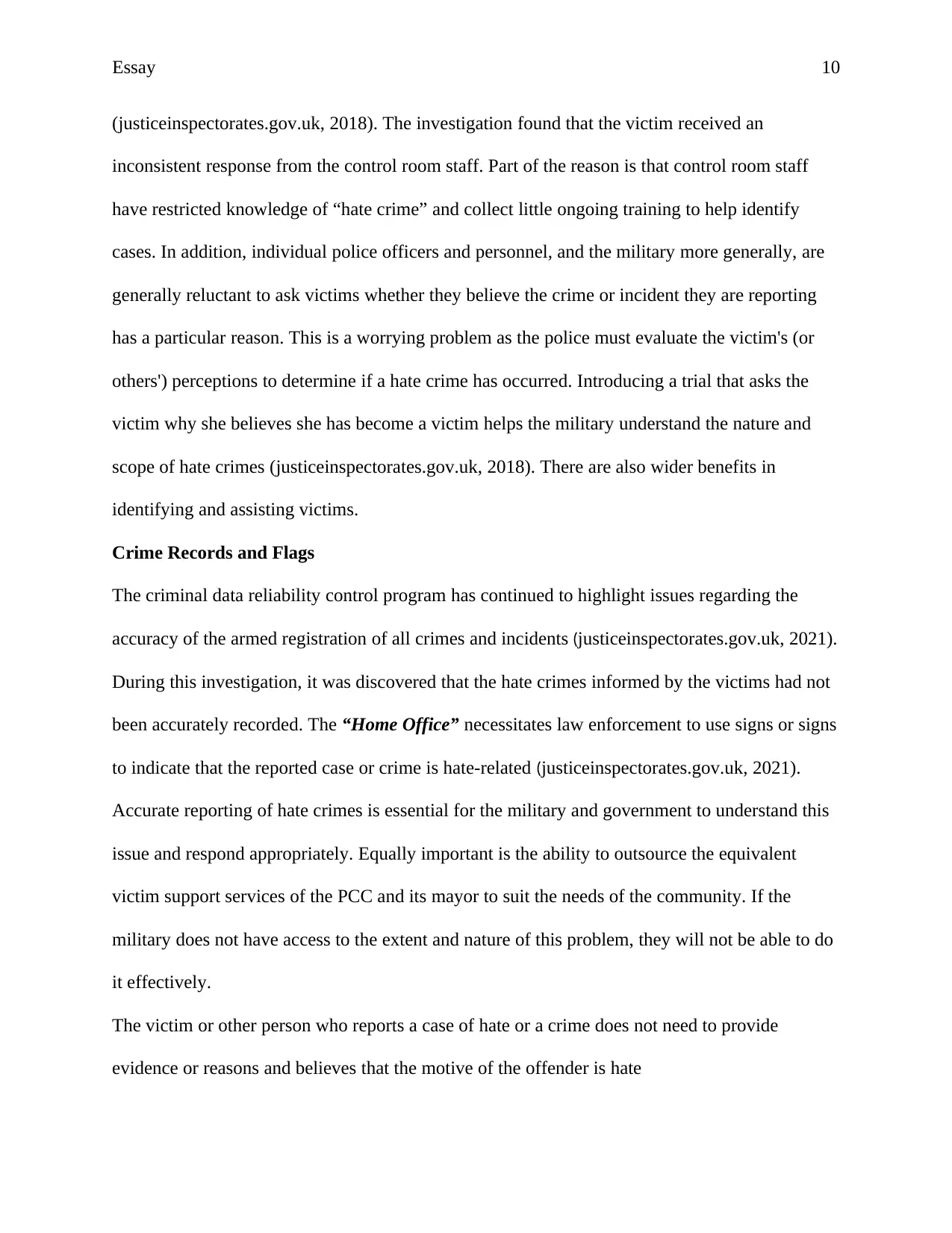
Essay 10
(justiceinspectorates.gov.uk, 2018). The investigation found that the victim received an
inconsistent response from the control room staff. Part of the reason is that control room staff
have restricted knowledge of “hate crime” and collect little ongoing training to help identify
cases. In addition, individual police officers and personnel, and the military more generally, are
generally reluctant to ask victims whether they believe the crime or incident they are reporting
has a particular reason. This is a worrying problem as the police must evaluate the victim's (or
others') perceptions to determine if a hate crime has occurred. Introducing a trial that asks the
victim why she believes she has become a victim helps the military understand the nature and
scope of hate crimes (justiceinspectorates.gov.uk, 2018). There are also wider benefits in
identifying and assisting victims.
Crime Records and Flags
The criminal data reliability control program has continued to highlight issues regarding the
accuracy of the armed registration of all crimes and incidents (justiceinspectorates.gov.uk, 2021).
During this investigation, it was discovered that the hate crimes informed by the victims had not
been accurately recorded. The “Home Office” necessitates law enforcement to use signs or signs
to indicate that the reported case or crime is hate-related (justiceinspectorates.gov.uk, 2021).
Accurate reporting of hate crimes is essential for the military and government to understand this
issue and respond appropriately. Equally important is the ability to outsource the equivalent
victim support services of the PCC and its mayor to suit the needs of the community. If the
military does not have access to the extent and nature of this problem, they will not be able to do
it effectively.
The victim or other person who reports a case of hate or a crime does not need to provide
evidence or reasons and believes that the motive of the offender is hate
(justiceinspectorates.gov.uk, 2018). The investigation found that the victim received an
inconsistent response from the control room staff. Part of the reason is that control room staff
have restricted knowledge of “hate crime” and collect little ongoing training to help identify
cases. In addition, individual police officers and personnel, and the military more generally, are
generally reluctant to ask victims whether they believe the crime or incident they are reporting
has a particular reason. This is a worrying problem as the police must evaluate the victim's (or
others') perceptions to determine if a hate crime has occurred. Introducing a trial that asks the
victim why she believes she has become a victim helps the military understand the nature and
scope of hate crimes (justiceinspectorates.gov.uk, 2018). There are also wider benefits in
identifying and assisting victims.
Crime Records and Flags
The criminal data reliability control program has continued to highlight issues regarding the
accuracy of the armed registration of all crimes and incidents (justiceinspectorates.gov.uk, 2021).
During this investigation, it was discovered that the hate crimes informed by the victims had not
been accurately recorded. The “Home Office” necessitates law enforcement to use signs or signs
to indicate that the reported case or crime is hate-related (justiceinspectorates.gov.uk, 2021).
Accurate reporting of hate crimes is essential for the military and government to understand this
issue and respond appropriately. Equally important is the ability to outsource the equivalent
victim support services of the PCC and its mayor to suit the needs of the community. If the
military does not have access to the extent and nature of this problem, they will not be able to do
it effectively.
The victim or other person who reports a case of hate or a crime does not need to provide
evidence or reasons and believes that the motive of the offender is hate
Paraphrase This Document
Need a fresh take? Get an instant paraphrase of this document with our AI Paraphraser
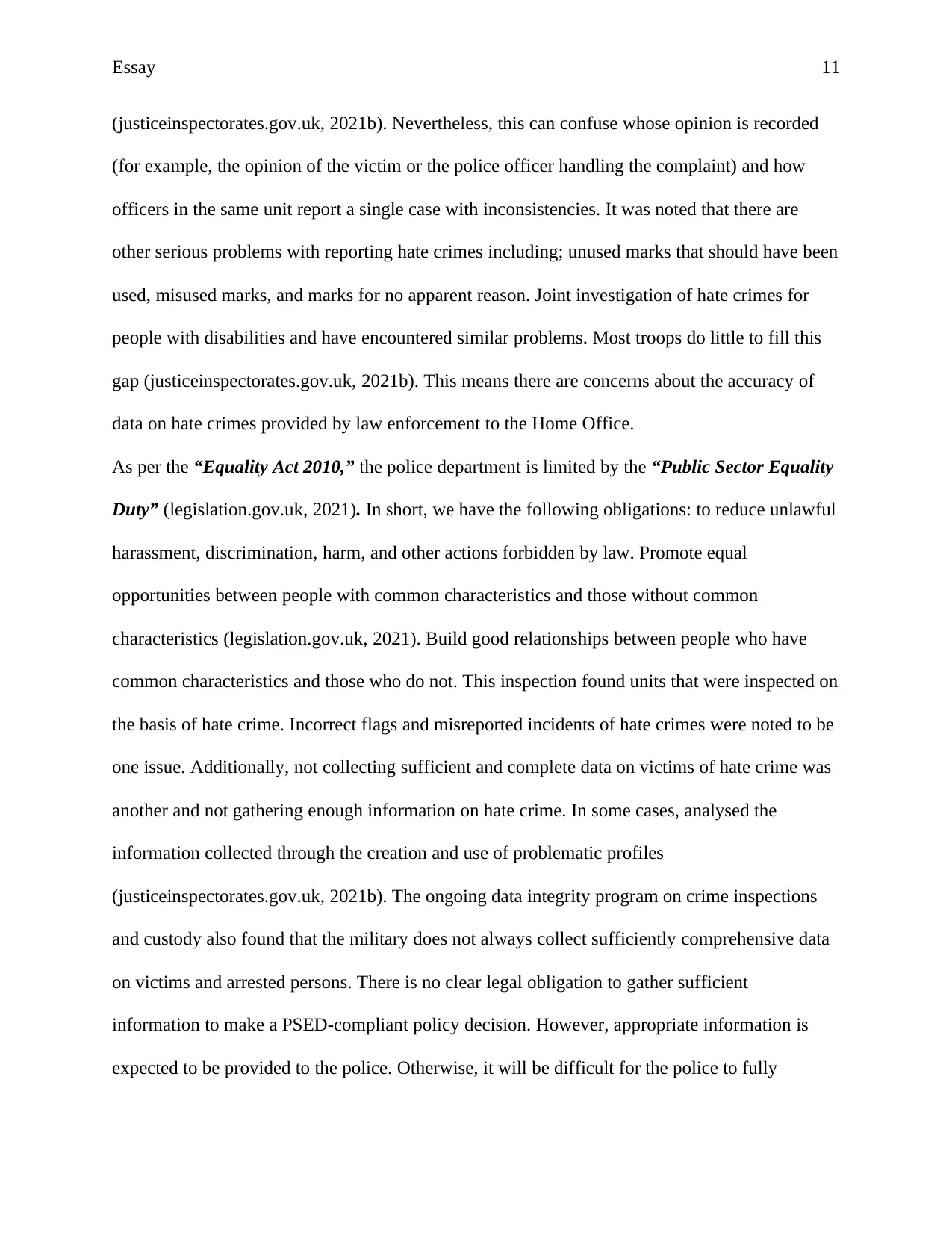
Essay 11
(justiceinspectorates.gov.uk, 2021b). Nevertheless, this can confuse whose opinion is recorded
(for example, the opinion of the victim or the police officer handling the complaint) and how
officers in the same unit report a single case with inconsistencies. It was noted that there are
other serious problems with reporting hate crimes including; unused marks that should have been
used, misused marks, and marks for no apparent reason. Joint investigation of hate crimes for
people with disabilities and have encountered similar problems. Most troops do little to fill this
gap (justiceinspectorates.gov.uk, 2021b). This means there are concerns about the accuracy of
data on hate crimes provided by law enforcement to the Home Office.
As per the “Equality Act 2010,” the police department is limited by the “Public Sector Equality
Duty” (legislation.gov.uk, 2021). In short, we have the following obligations: to reduce unlawful
harassment, discrimination, harm, and other actions forbidden by law. Promote equal
opportunities between people with common characteristics and those without common
characteristics (legislation.gov.uk, 2021). Build good relationships between people who have
common characteristics and those who do not. This inspection found units that were inspected on
the basis of hate crime. Incorrect flags and misreported incidents of hate crimes were noted to be
one issue. Additionally, not collecting sufficient and complete data on victims of hate crime was
another and not gathering enough information on hate crime. In some cases, analysed the
information collected through the creation and use of problematic profiles
(justiceinspectorates.gov.uk, 2021b). The ongoing data integrity program on crime inspections
and custody also found that the military does not always collect sufficiently comprehensive data
on victims and arrested persons. There is no clear legal obligation to gather sufficient
information to make a PSED-compliant policy decision. However, appropriate information is
expected to be provided to the police. Otherwise, it will be difficult for the police to fully
(justiceinspectorates.gov.uk, 2021b). Nevertheless, this can confuse whose opinion is recorded
(for example, the opinion of the victim or the police officer handling the complaint) and how
officers in the same unit report a single case with inconsistencies. It was noted that there are
other serious problems with reporting hate crimes including; unused marks that should have been
used, misused marks, and marks for no apparent reason. Joint investigation of hate crimes for
people with disabilities and have encountered similar problems. Most troops do little to fill this
gap (justiceinspectorates.gov.uk, 2021b). This means there are concerns about the accuracy of
data on hate crimes provided by law enforcement to the Home Office.
As per the “Equality Act 2010,” the police department is limited by the “Public Sector Equality
Duty” (legislation.gov.uk, 2021). In short, we have the following obligations: to reduce unlawful
harassment, discrimination, harm, and other actions forbidden by law. Promote equal
opportunities between people with common characteristics and those without common
characteristics (legislation.gov.uk, 2021). Build good relationships between people who have
common characteristics and those who do not. This inspection found units that were inspected on
the basis of hate crime. Incorrect flags and misreported incidents of hate crimes were noted to be
one issue. Additionally, not collecting sufficient and complete data on victims of hate crime was
another and not gathering enough information on hate crime. In some cases, analysed the
information collected through the creation and use of problematic profiles
(justiceinspectorates.gov.uk, 2021b). The ongoing data integrity program on crime inspections
and custody also found that the military does not always collect sufficiently comprehensive data
on victims and arrested persons. There is no clear legal obligation to gather sufficient
information to make a PSED-compliant policy decision. However, appropriate information is
expected to be provided to the police. Otherwise, it will be difficult for the police to fully
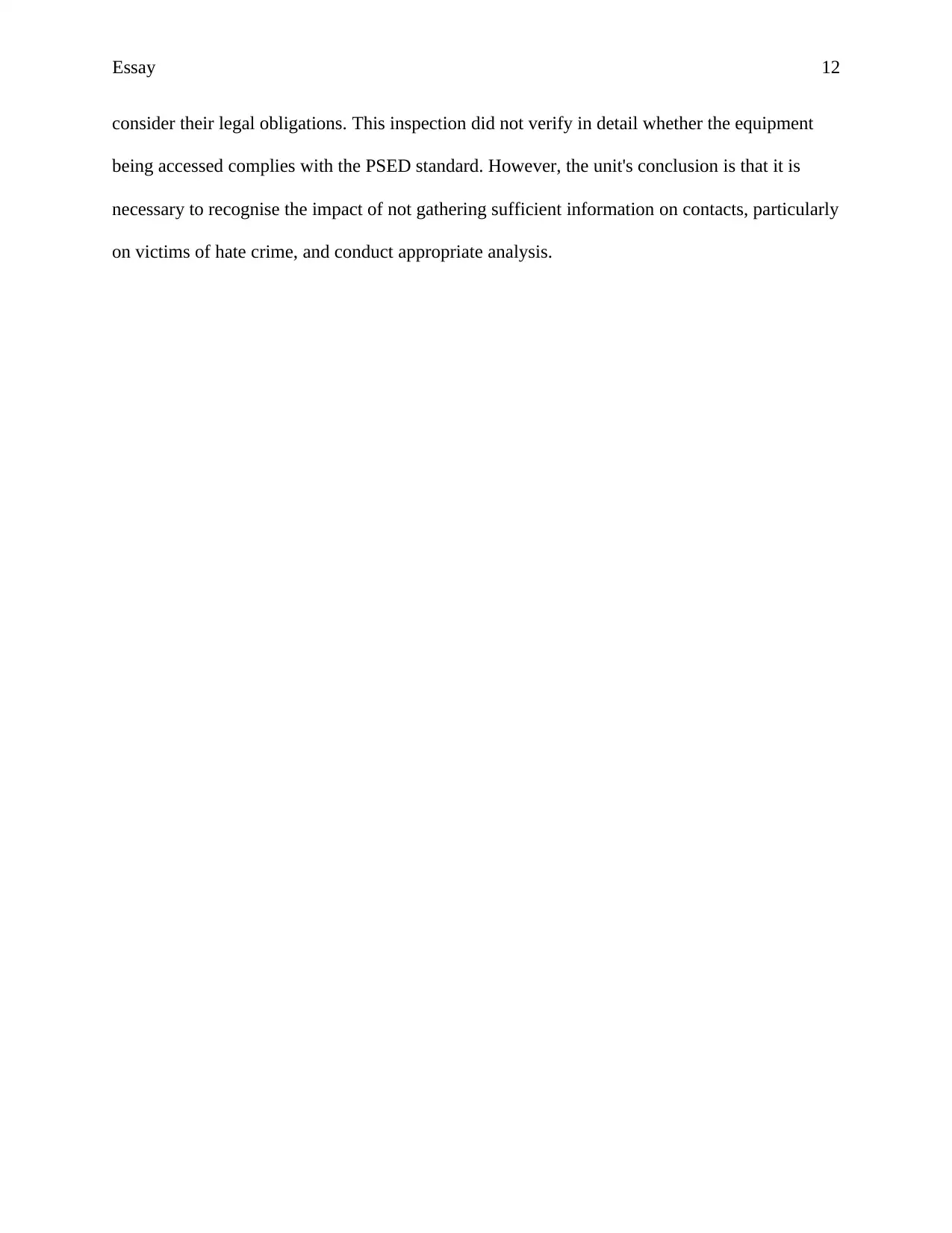
Essay 12
consider their legal obligations. This inspection did not verify in detail whether the equipment
being accessed complies with the PSED standard. However, the unit's conclusion is that it is
necessary to recognise the impact of not gathering sufficient information on contacts, particularly
on victims of hate crime, and conduct appropriate analysis.
consider their legal obligations. This inspection did not verify in detail whether the equipment
being accessed complies with the PSED standard. However, the unit's conclusion is that it is
necessary to recognise the impact of not gathering sufficient information on contacts, particularly
on victims of hate crime, and conduct appropriate analysis.
⊘ This is a preview!⊘
Do you want full access?
Subscribe today to unlock all pages.

Trusted by 1+ million students worldwide
1 out of 13
Related Documents
Your All-in-One AI-Powered Toolkit for Academic Success.
+13062052269
info@desklib.com
Available 24*7 on WhatsApp / Email
![[object Object]](/_next/static/media/star-bottom.7253800d.svg)
Unlock your academic potential
Copyright © 2020–2026 A2Z Services. All Rights Reserved. Developed and managed by ZUCOL.




